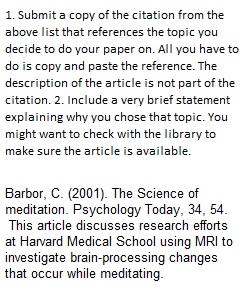


Q In a week or so you will be writing a Mid-Term reaction paper on a topic from the list in the link below. These topics cover Chapters 1-7 from the first half of this semester. Most, if not all, of these articles can be found in the Library. From your portal, you can access the EBSCO link under Library Databases and search there. For assistance, visit the library and ask for help. Some can be found in Google. I've downloaded the ones I could find and put them in the Additional Resources for each chapter. Bibliography 1-7.docx Now would be a good time to review the following information from Week 2, particularly the Rubric for a Reflective Paper: Additional Resources for Reaction Papers or Reflective Writing For this assignment, you will: 1. Submit a copy of the citation from the above list that references the topic you decide to do your paper on. All you have to do is copy and paste the reference. The description of the article is not part of the citation. 2. Include a very brief statement explaining why you chose that topic. You might want to check with the library to make sure the article is available. This assignment is due Friday. For those of you unfamiliar with the APA Style format, the following page is probably one of the best resources: Purdue Writing Lab - APA Formatting and Style Guide You can find an APA Template for Microsoft Word in the Announcements page. View Rubric Mid-Term Paper Topic Mid-Term Paper Topic Criteria Ratings Pts Description of criterion view longer description 10 pts Full Marks Response includes the citation and and a statement explaining why that topic was chosen. 5 pts Missing one element 0 pts Missing both required elements. / 10 pts Total Points: 0
View Related Questions